
王峰十问第23期 | 火币朱嘉伟:全面回应上币政策、高破发率、HADAX风波.....(英文原版)
July 6,22:00 Beijing Time,Jiawei Zhu, COO of Huobi joins Fred Wang of Mars Finance at "10 Q with Fred Wang".
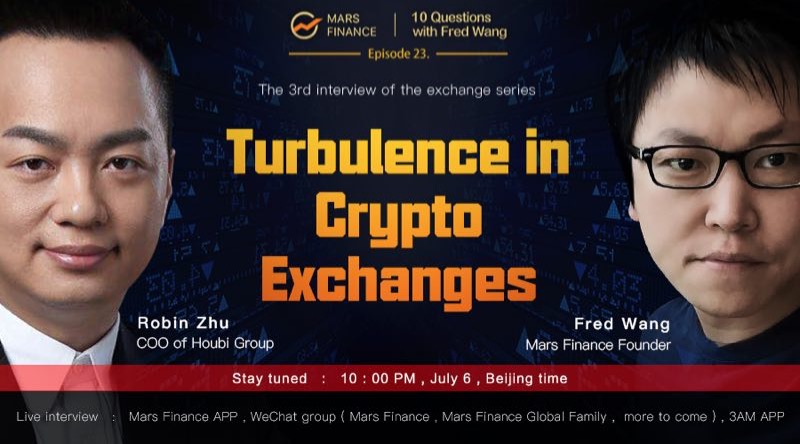
"Depending on how you look at it, a goodproject can grow an exchange while a bad project can ruin an exchange, or theopposite can be true as well: an exchange could also make or break a project."
Jiawei Zhu, COO of Huobi
Time: 22:00 July 6th, -00:50 July 7th Beijing Time
Groups: Mars 3.0 wechat group
Participants:
Jiawei Zhu: COO of Huobi, tookover HADAX after thebacklash. He had previously worked at Oracle and Capgemini.
Fred Wang: Founder of Mars Finance,chairman of Linekong (HK. 8267), founder of Consensus Lab, and the foundingpartner of Geek Founders
Fred Wang: Hi, everyone. Welcome to Mars Finance’s “10 Q with Fred Wang.”Joining us today is Mr.Jiawei Zhu, the COO of Huobi.
Let’s look at Mr. Jiawei Zhu’s bio: He graduatedfrom Haihe University Graduate school; Joined Oracle in 2007; Became PM at Capgemini China, responsible for famousclients like Tencent, Sohu, Quna.com, Phenix and Huarun; he then Joined Huobiin 2015, and held positions including CEO assistance, Director of Operations and COO.
Traditional digital currency exchangesare having a hard time lately, with Huobi being no exception. Taking a blowfrom “trading is mining”exchanges represented by FCoin not long ago, Huobifaced the withdrawal of several blockchain VCs in protest of the new super node rules last Friday. Be itthe new competition or boycott from partners, all the conflicts center aroundone word——listing.
What’s the standard for listing? Why isit so expensive? Why are some projects unable to get listed? Why have so manyprojects failed in their debut? I believe many people have asked similarquestions. As the market grows, project owners and investors are becoming morerational. In this trading war, will they stay or jump ship? Everyone will “votewith their feet” to make their own choices.
It’s our pleasure to have Mr. Zhu with ustoday. Huobi is at the center of the listing crisis. I hope Mr. Zhu canreconstruct this event and tell us what exactly happened in an open and candidmanner with our readers, so that we can all go deeper into the issue calmly. Let’sbegin today’s“10 Q with Fred Wang.”
Question 1 facingHADAX crisis, super nodes withdrew
Fred Wang: I guessyou didn’t expect that publishing the updated HADAX(Huobi Autonomous Digital Asset Exchange)would cause such a big stir and backlash against Huobi. HADAX released newrules on June 29th which divide supernodes into two subsets, dubbed “standing nodes” which are mostly traditionalventure capital firms and “selected nodes” which are mostly token funds.According to the new rules, all projects for the public voting list on HADAXmust be supported by at least one standing node. This will obviously reduce theleverage of selected nodes in deciding which tokens can be listed on the HADAXplatform. What’s the rationale behind this arrangement? Will token funds feeldiscriminated against? To quote Weixing Chen, “I don’t want to die in the oldsociety. I want to live in the new world.” Why did you choose to favor “the wayin the old society” in deciding on new listings?
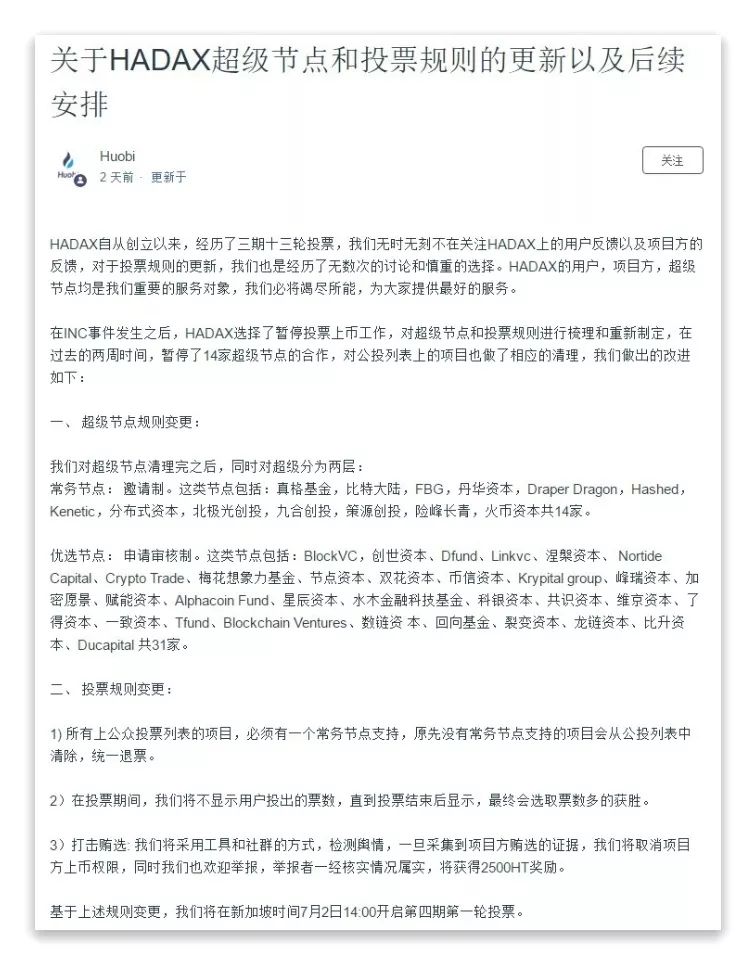
Jiawei Zhu: That’s a long story. As thetesting field of blockchain projects, on one hand, we need to introduce morestart-up projects so that investors can enjoy the dividends of earlyinvestment; on the other hand, in this fast-changing industry where moststart-ups fail, we need to control the risk. These two conflicting tasks pushus to debate and think about how to do a better job. This has always been ourgoal.
Since its publishing, HADAX has conducted13 rounds of public voting, from the oldest bidding to airdrop incentives,from the introduction of deposit to super nodes mechanism, and eventually freevoting. Each round of rule changes have aimed to select better projects forinvestors through the operation of this community.
However, due to various reasons, we foundout that in executing those changes, some super nodes behaved completelyagainst our original design. Especially after the INC incident, we havereceived feedback from different parties and it dawned on us that reforming therules would be required.
Therefore we postponed new token listingand worked on the project sources by implementing the “standing node”solution, which is the first time in which HADAX had applied asponsor system from traditional industry in the blockchain sector.
Many incredible funds have emerged in thefast-growing blockchain sector but due to their short history, their projectsrequire longer observation periods. That’s why we want to make super nodes thesponsor of projects and bind the brands of super nodes together with thedevelopment of the projects. This not only makes evaluating the performance ofsuper nodes easier but also pressures them to audit projects strictly and holdthem accountable for the projects they recommend.
We originally hoped super nodes couldhelp screen and recommend good projects and follow up on them, but this hasproven not to be the case.. Thus, we have implemented the sponsor system.
The same reason why we invitedtraditional venture capital since the beginning of the year. This is not adiscrimination against token funds. We give VCs more opportunity in the hopesof accelerating the development of this industry. There is no competitionbetween them. VCs are not here to steal business from token funds. Instead, thetwo can together make the pie bigger and realize innovation that was notpossible from within. Excessive liquidity makes people conclude that startingup a business is easy money. Many people have gone crazy over this idea.
Only a few start-ups can make it. It isnot normal to see hundreds of new projects globally within merely a month. Beit entrepreneurs or institutional investors or individual investors, someonewill get hurt, which is something we don’t want to see. Traditional VCs haveaccumulated investment theories and methodology over the years, which can bringnew ideas and practices to the blockchain sector and that is why we are so keento bring them in.
Fred Wang: Jun Du believes that node capital will work with exchanges like FCoin to make listing free,saying “Exchanges have lost their domination and monopoly for good” on Wechatmoments with a middle-finger picture and some vulgar language.
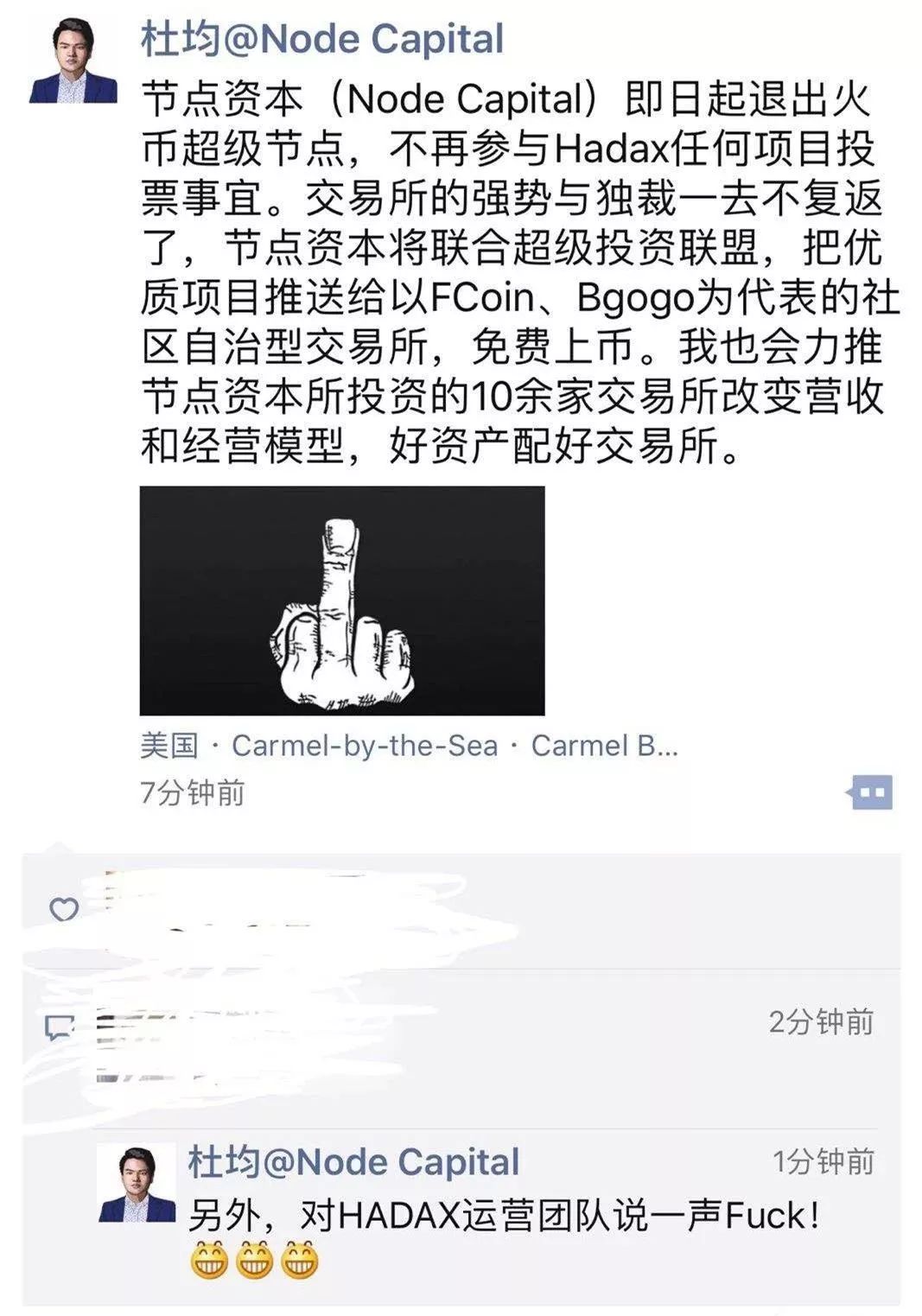
Dong Zhao, founder of Dfund announced thatit will withdraw and no longer be involved in the super node vote.

Apparently, Jun Duand Dong Zhao are very upset about the new rules. As the COO of Huobi, you areresponsible for listing. I can only imagine the pressure you are under, bothexternally and internally. Do you think this is the biggest PR crisis for thelisting department of Huobi so far? Is this change brought on by the strongposition of new assets? Since this crisis happened while Lin Li was on holiday, how was the conversationbetween you two?
Jiawei Zhu: First of all, failing tocommunicate the rule changes with super nodes ahead of the time was our fault.I would like to take this opportunity to apologize to super node partners andteams. We plan to build a communication mechanism in the near future. In thepast week, I arranged meetings with many super node partners and chatted for along time. Next week I will meet with the rest of them. I believe we can clearup this misunderstanding through dialogue. We share a common goal with supernodes, that is to help select good projects for users. Our mission is highlyaligned here.
Jun Du is an early co-founder of Huobi.We are very tight. Dong Zhao is one of our oldest customers. We met and talkedthe next day after the update. He and other people behind our super nodes wereall understanding and wished to walk along the path with us, and I am trulygrateful to them. We are so lucky to test the water with so many good partners,so I don’t really think of this as a crisis, but rather an opportunity thatallows me to deepen my understanding of super nodes and what we potentiallyhave to offer.
We have been busy preparing for HADAX2.0recently. We hope to construct a brand-new HADAX to the industry and usersthrough deeper innovation. As for Lin Li being on vocation, it’s not a bigdeal. We were in touch the whole time so he has been updated on the event andour response, as you can see in his Wechat moment posts.
Fred Wang: SinceHADAX was first published, there have been four different rule adjustments, butwhy has none managed to satisfy everyone? In his latest statement, Lin Li saidthat HADAX must be rebuilt and another major update would arrive in July. I don’tknow if you will solicit opinions from a wider pool.
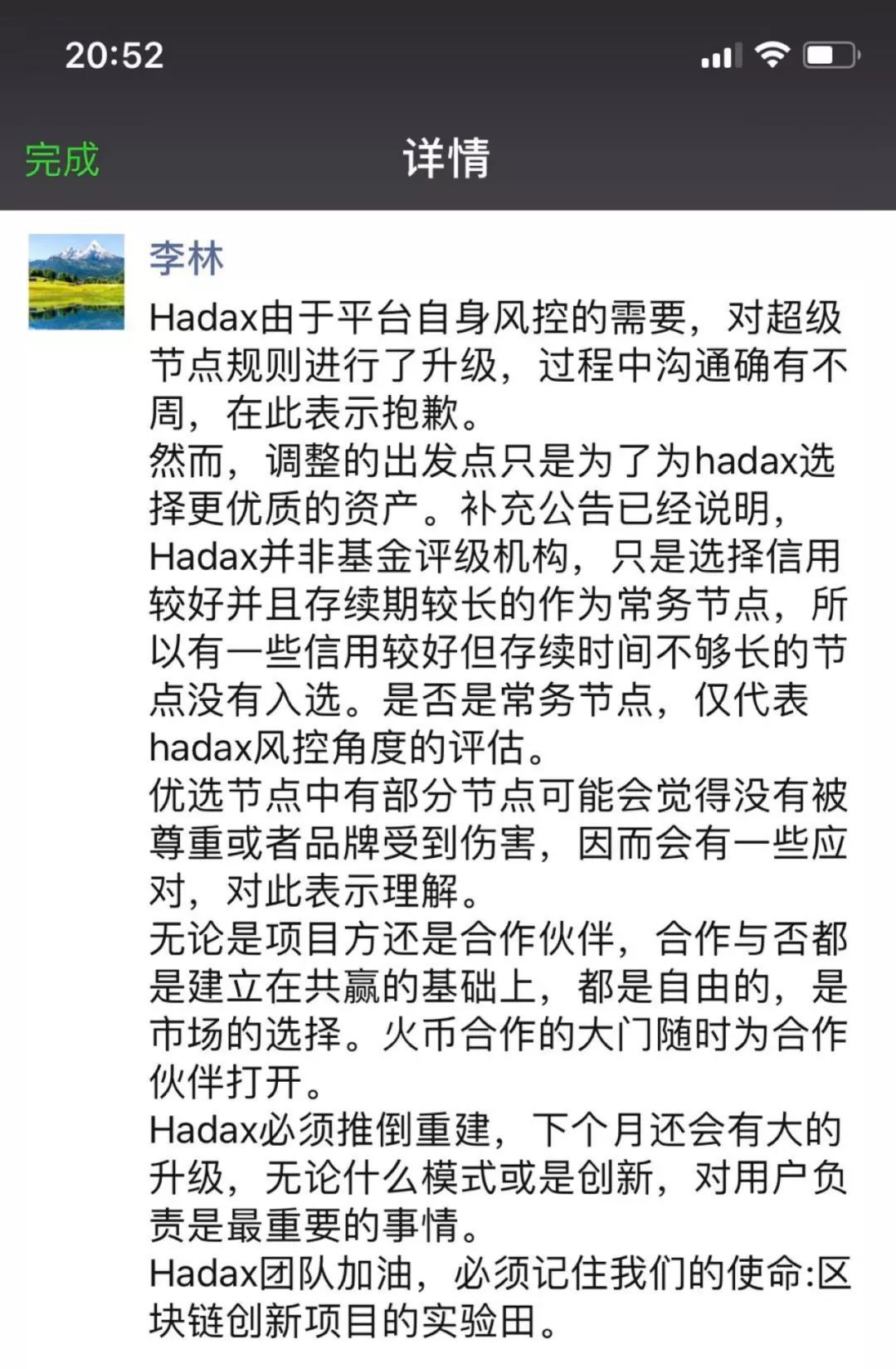
Not long ago,Dovey Wan from Danhua Capital proposed a “reverse votingmechanism ”--projects with the most votes will not be listed, because thecost of up-voting oneself into top 10 will be significantly lower thandown-voting others. This mechanism has the additional benefit offraud-reporting. Have you considered Dovey’s solution or any other, betterones?
Jiawei Zhu: We never stopped debatingabout the rules since the release of HADAX. There is an old Chinese saying, ”acountermeasure for every move”. There is no such thing as a perfect mechanismor rules, which will be optimized in execution. This is both the charm andsticking point of operating through community consensus.
All the criticism we have received this year has been about HADAX. Some say thisis a self-defeating move. Why bother when Huobi Pro and other parts of thebusiness such as stations, mining pools, wallet and Eco-system are doing sowell? HADAX is our dream. We believethat building an eco-system though the community will be one of the main trendsin the future. Due to tokenomics and incentives, more decisions are needed fromthe community and effective incentives lead to more rational decision-making.We need to learn how to work as a community. We are trying and the wholecommunity is trying. This is a first time for all of us. We need to accept thatevery innovation comes with a price.
We want to bring about better rulesthrough optimization. We solicited opinions from super nodes this week. Italked to Dovey about her idea in phase one. We tested the affirmative vote/dissenting voteoption, and found that ties are very common in reality. We also have someinteresting ideas like “weekly listing”, where we update the progress, weeklyreport, roadshow videos, live-streaming of projects, HR info, and finances on aplatform. A minimum of one update every 8 weeks is needed to be listed forpublic voting so that people are updated about the project. Super nodes and HTholders can press like or dislike buttons to up-vote or down-vote projects. Weare brainstorming every day. Any and all suggestions are welcomed.
Question 2: Why78% of the projects fell on debut on HADAX?
Fred Wang: Different from the Huobi Pro, released last July, HADAX, short for “HuobiAutonomous Digital Asset Exchange,” is a whole new sub-brand of Huobi Pro whosemost distinctive feature is listing by public voting, and being free-of-charge.Up until July 5th, 40 tokens had been launched on HADAX, among which31 tokens’ price fell on their first day of trading. In other words, 78% ofthem fell on debut. Some even claims that HADAX has become a place for junkprojects. Some media reported that soliciting and buying votes are commonplaceon HADAX. Given this situation, can HADAX continue to make these rules work?
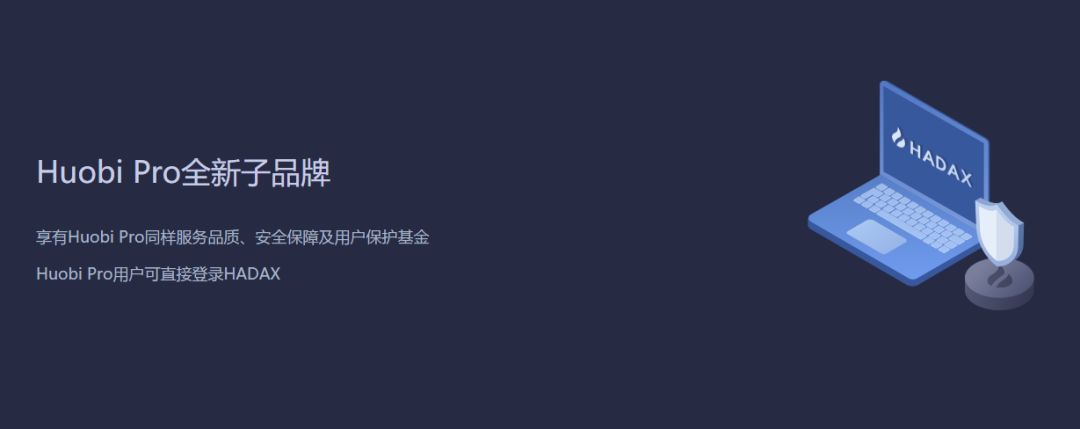
Jiawei Zhu: Many factors can contributeto a fall on debut, including bear market, over-pricing, and difficulties indelivering the projects. Major assets like Bitcoin and ETH have dropped by 60%since the start of this year, reflecting a lack of confidence in the market. Itis a norm in the financial market to have over-evaluation during bull market,with prices falling during a market downturn.
There is a misunderstanding in the marketthat rising prices are signs of good projects and falling projects are alljunk. In fact, short-term volatility can’t be the indicator for projectquality. As a project goes on and gets promoted, good projects will be noticedby the market. Perhaps long-term volatility is more note-worthy. Therefore,going forward, HADAX will ask project owners to update and do roadshows on theplatform, like the aforementioned “weekely listing,”where the performance ofevery project will be transparent and made public.
In the case of buying votes, as mentionedin the latest update, we will crack down on off-line bribery. In the meantime,we also welcome whistle-blowing. Once caught, violators will be removed fromour platform. We will also fight against non-transparency in the implementationof rules in the future.
Fred Wang: HADAX released the pilot programof Huobi Pro transfer from HADAX, which sets requirements on averagetransactions, number of traders, evaluation model, and so on for projects to belisted, andchanges voting to bi-monthly. “In layman’s term, in order to pushthe token price up, enough trading depth is needed”; some project owners feelthat “It’s hard to make a breakthrough unless you burn through your cash.” Onemonth after its release, not a single project was transferred from HADAX toHuobi Pro.
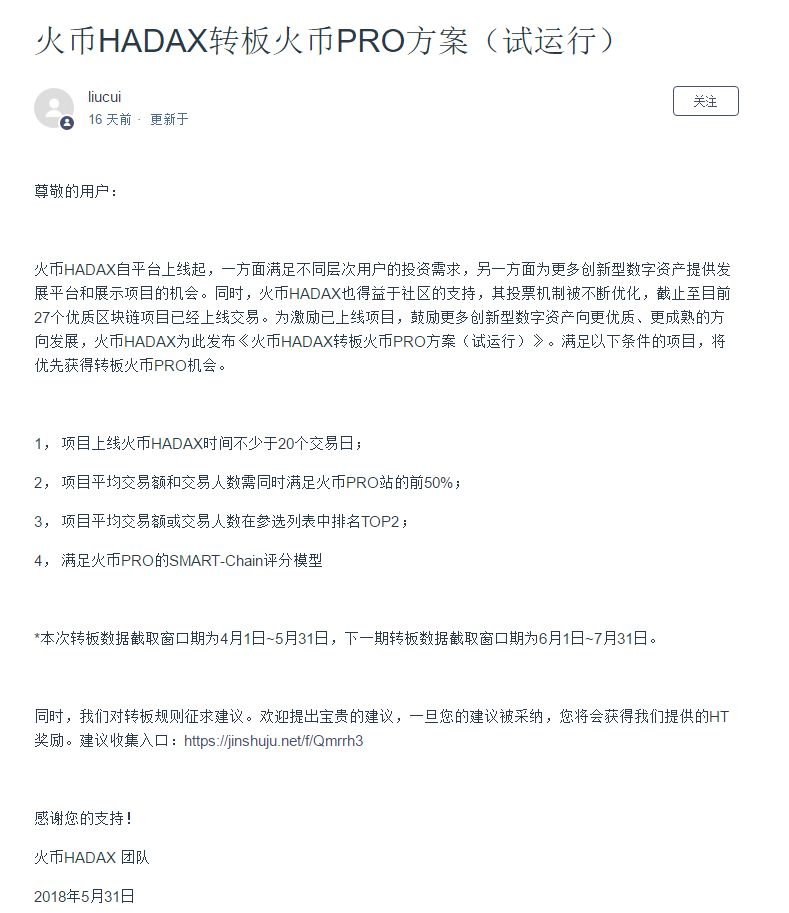
Is burning cash the only way to achieve asuccessful transfer? Is this transfer program only good on paper? What canproject owners gain from a successful transfer? I am concerned that there arenot enough incentives for transfer.
Jiawei Zhu: The reason why no projectshave been transferred was because at the time those projects couldn’t meet therequirement. Huobi Pro was created for mature projects and HADAX for start-upprojects. Number of traders is an important indicator for project maturity.Another requirement is a SMART CHAIN asset model.
In addition, increasing trading volume bymass spending is a misguided solution. Trading volume varies depending onproject progress. A better performance is only possible when investorconfidence in the cryptocurrency is boosted by updating the progress, and thetoken empowered via greater usage. This also costs money, but in a differentway.
Dong Zhao(Founder of DFund): I thinkHADAX is a meaningful trial, but a failure. What’s your take?
Jiawei Zhu: lol. I would like to phraseit in the opposite way, while we have hit some bumps on the way, thismeaningful trial must continue.
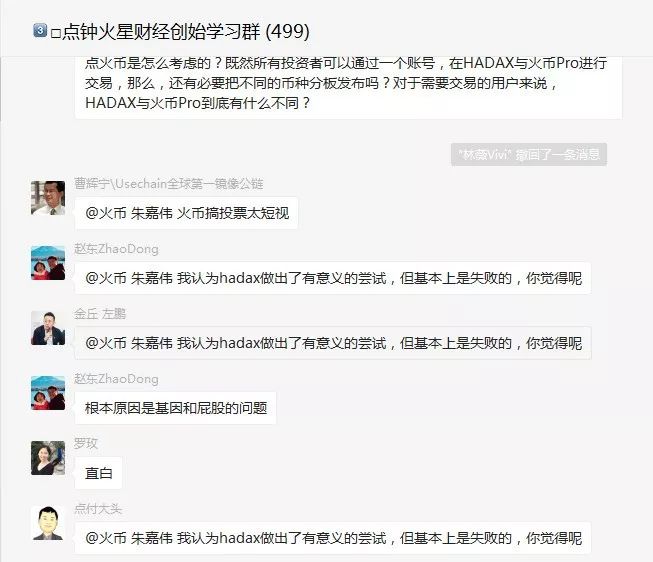
Fred Wang: Allowing transferring of projects under certain conditions is not a cryptocurrencycyclical invention but a mature and long-existing mechanism in the traditionalfinancial market. Take China as an example, anyone can invest in A-shares, butonly qualified investors (with at least ¥5 million of securited assets) cantrade in the “new three” board.
HADAX and HuobiPro only make distinctions between different projects but haven’t made investoradmittance standards. What does Huobi think of this? Since all investors cantrade on HADAX and Huobi Pro through one account, is it necessary to listdifferent tokens separately? What’s the difference between HADAX and Huobi Profor users who want to trade?
Jiawei Zhu: When HADAX was first created, we set investoradmittance standards of HADAX trading at 1BTC and above or users with more than30 days of trading. The main purpose of that was to alert investors about therisks that projects on HADAX are more volatile and riskier than those on HuobiPro.
After a while, our goal was basicallyachieved—usershad a clear understanding of the differences between Huobi Pro and HADAX , sowe canceled it. Data shows insignificant changes before and after thecancellation. Therefore, this is not the point. The point is operating bycommunity. HADAX will continue to be the testing field for blockchain projectsthrough community recommendation and selection. Just as Dong once said, wemight face failures, but the dream keeps us going.
Question 3: “trading-is-miningis very innovative. Huobi will closely follow it”
Fred Wang: Lately, leading exchanges have been busyresponding to the formidable challenge brought by FCoin. OKEx also announced their Open and Win-win Plan whichsupports 100 “trading is mining” exchanges. Soon later, Binance launched “the DigitalAsset Exchange Alliance Program” and will support up to 1000 “trading ismining” exchanges. Two out of the top four exchanges were forced to respond butHuobi was seemingly sitting tight, and only announced the upgrade from “Huobiglobal points(火币全球通用积分)”to “Huobi global etoken(火币全球生态通证)”” and itsdetailed measures 3 days later.
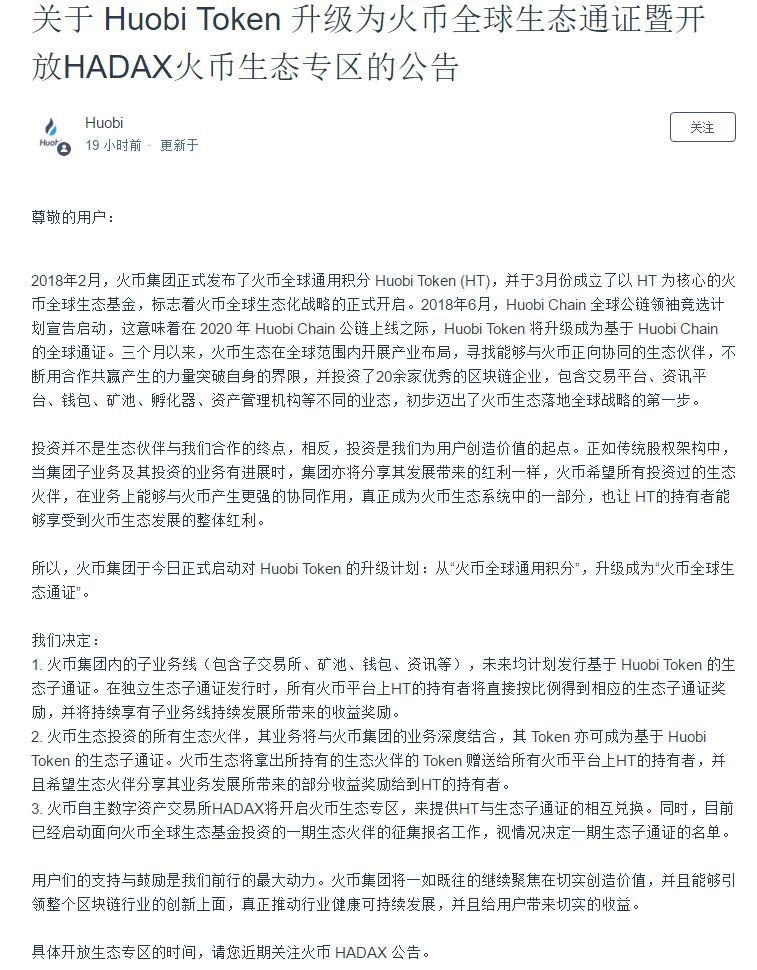
In my view, FTrelies on the share dividend of exchanges, while HT relies on the eco-dividendof exchanges, which are two different models. What’s Huobi’s chances? WillHuobi imitate the “trading is mining” model?
Jiawei Zhu: Many think Huobi didn’tcomment on the “trading is mining” model, but we actually already have had aheated debate internally. We also follow up data on this model from differentexchanges. This model no doubt is very innovative in tokenomics. Fcoin itselfis undergoing fast and drastic changes. It’s hard to say if Huobi will followsuit or not but we will closely follow it for sure. After all, the mandate ofall exchanges is to serve the users.
Our strategy this year is to build aneco-system for the industry. A good eco-system with the exchange at the centerand upheld by a global community can have a far more profound impact for theindustry. This also paves the way for our future public chain strategy. JianZhang is my former colleague, with whom I have a good relationship. If FCoincan rise up, we will be happy for him. It’s a privilege to innovate and expandthe market together with people like him.
FredWang: In the internet world, competition is usually fueled by rounds and roundsof financing and subsidizing users, and the last one standing wins the war andbecomes the monopoly in the market. Companies like Wechat, Didi, and JD.com arethe survivors of those fierce battles. Following the success of FCoin, copycatsof “trading is mining” exchanges balooned, but there are few standouts. Do youthink there will be one dominating “trading is mining” exchange like whathappened in social media, shared economy and e-commerce sectors? It seems thatFcoin is the front runner. Earlier, Dong Zhao asked me if it should be a singleplayer or multiple player market. Do you think it is time that FCoin receiverecognition from the market?
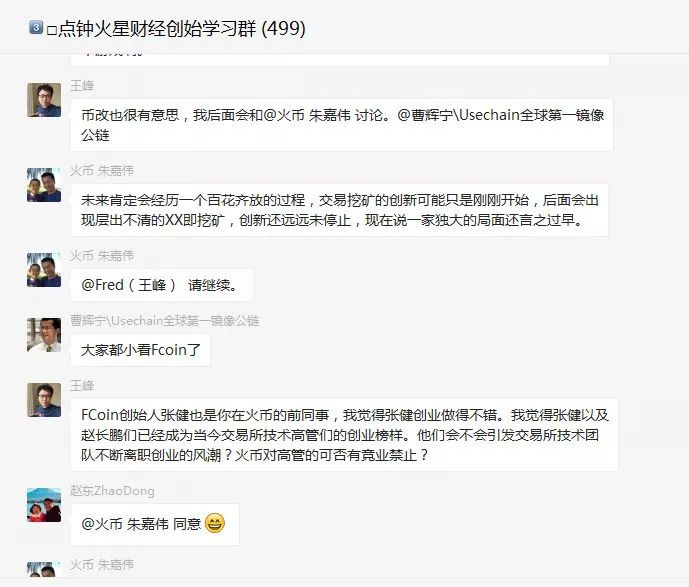
Jiawei Zhu:This industry is far fromsettled down and is changing rapidly. The exchange with the highest tradingvolume globally changed several times in the past 12 months and it’s verycompetitive. The industry will certainly become increasingly crowded. This new “tradingis mining” model is just the beginning of many more innovative models to come.It’s too soon to say who will dominate the market.
FredWang: The founder of FCoinJian Zhang worked with you in Huobi. I think his start-up is doing well. NowZhang and Zhao have become role models for high-level technology officers whowant to start their own business. Will they start a trend of techniciansquitting their jobs? Does Huobi have non-compete agreements forexecutives?
Jiawei Zhu: We have signed non-competeagreements with all employees and executives. Jian Zhang left in 2016 andworked in a blockchain technology company for a year, which was not incompetition with Huobi. By the time he founded FCoin, the agreement had alreadyexpired. The culture and values of a company is what retains talent. Whenemployees are aligned with the values and goals of a company, they will notleave. If not, leaving is the right thing to do. Many of our former employeespassed on our core values such as integrity, openness and teamwork, as well asour bottom-line which is no evil deeds allowed. This has made us proud and thevery reason why so many people join us.
Fred Wang: FCoin Announced a Main BoardBrand Upgrade and the Start of Tokenization Experimental Zone(Main Board C) inthe evening of July 5th, 2018. To put it simply, tokenization istraditional/internet companies+ token, or in other words, “blockchainization.”It echoes the internet+ concept coined few years ago. FCoin strives to gatherprojects with great potential in a rapidly-growing market made of internet + traditionalsectors. I think this is the bigger market that FCoin is really after. How doesHuobi think of it?
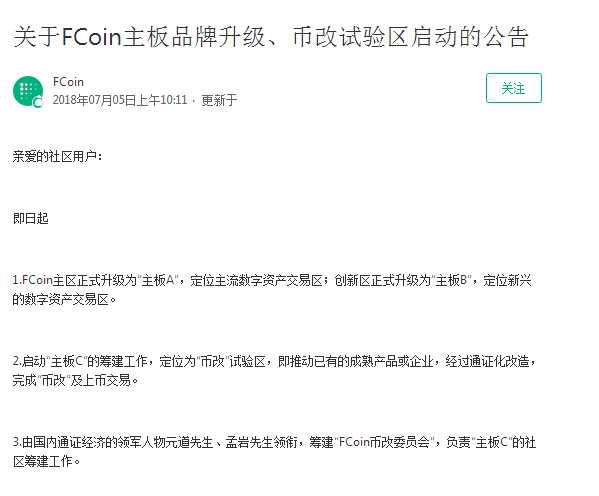
Jiawei Zhu: Regarding tokenizationreform, we started very early and called it a different name:“blockchain+.”Wesigned a collaborative agreement with Tianya(天涯) this March, and this is just thebeginning. “Blockchain +” has two dimensions: problem-solving through blockchaintechnologies or tokenomics models.
I discussed this with manytraditional/internet companies in person in the first half of this year on howto address their painpoints through tokenomics models. The competition occursnot in the trading market but in incubators and research institutes. The tokenomicsmodel design is a complicated science. I read hundreds of white papers, knowingfirst-handed the decisive role of token design. I believe our research team at Huobi Labs, a Blockchain Research Institute, gives us anedge by issuing industrial reports, big data analysis and many other in-deptresearch reports, which have been well-received in the market and translatedinto many languages overseas.
Fred Wang: I noticed that the HTeco-system focuses more on the middle and downstream of blockchain industry,such as mining pools, nodes and projects. However, FCoin seems to be moreoutward-looking, focusing more on the connection between the real economy andblockchain. Two different strategies, who will be the winner? Some say thisreform may disrupt tokenomics. Are you optimistic about the future of tokenomics?
Jiawei Zhu: As I said before, thecompetition of traditional business blockchain+ lies in the design, not intrading. I think Tokenomics is very promising. A good tokenomics model canboost the growth of the application. A good example would be Bitcoin. Whether aToken can incentivize a project is an important indicator for its success. Thisis a large part of the unlimited possibilities blockchain can offer to theworld.
Question 4: Huobi Wallet and RiskManagement System
Fred Wang: On the afternoon of June 9,five projects including INC accused Huobi of crushing the market in a popularcryptocurrency Wechat Group.. The chat history shows executives of the projectsaccusing Huobi of setting multiple data account on the platform, dumping thecoins after modifying their trading data, buying the coins back after the pricedrops to the lowest level, and eventually taking advantage of the projects atno cost. The incident ended with INC making a public statement apologizing tothe investors and to Huobi, but there are still suspicions. Did Huobi reallysteal from the projects by modifying trading data? Did the price of INC coindrop because the market feels bearish about it? Would you like to explain thisfurther?
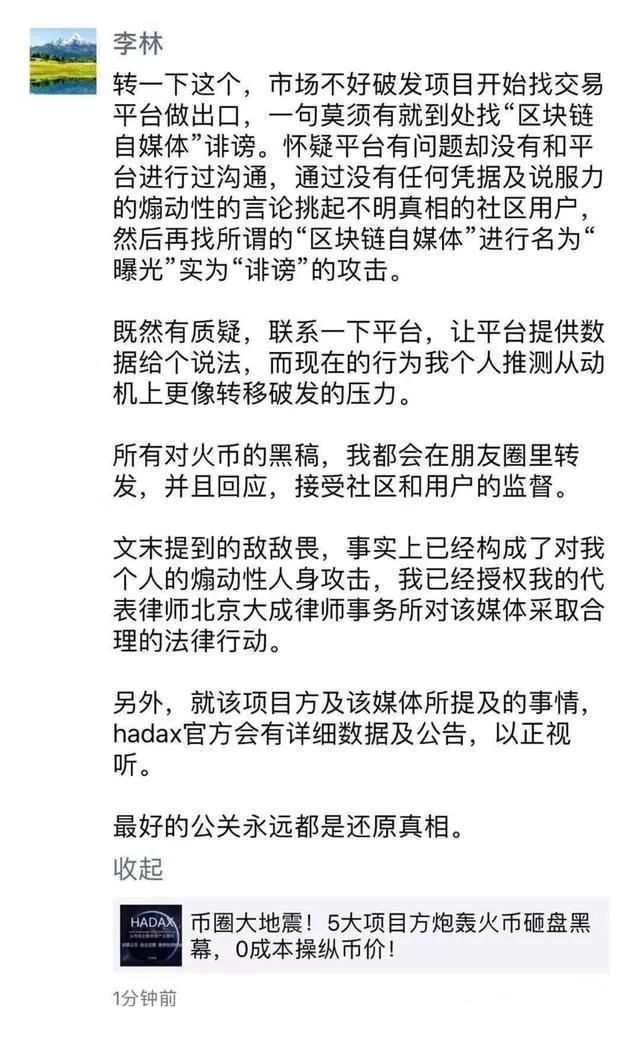
Jiawei Zhu: First of all, there is noreason for us to take advantage of the projects. When there are problems, we’llalso have to take time and effort to address them. Secondly, we do not have themotivation, as the trading fees can already support the team and the company. Afterthe outbreak of the incident, I immediately recalled all trading records of theproject. In fact, the sell orders from a single user, which the project ownersbrought up, are accumulated over time. Many users in the market refer toAPI-based strategic trading. They buy low and sell high frequently to makeprofit, which in turn leads to a greater number of buy and sell orders withlimited net value. Such misunderstandings were addressed later.
Mei Luo (AssociateProfessor of Tsinghua University): Some people suspect that as we do notsee the address of the exchange wallets, there is no way to know whether theexchange has embezzled coins from user accounts. How do you look at this?
Jiawei Zhu: The exchange wallet systemis crucial. For the sake of risk management, they are divided into theso-called hot wallets and cold wallets. Users put coins into the hot wallet,and the system gathers them at the withdrawal address after the deposit. Forlarge quantities, they are often gathered in the cold wallet.
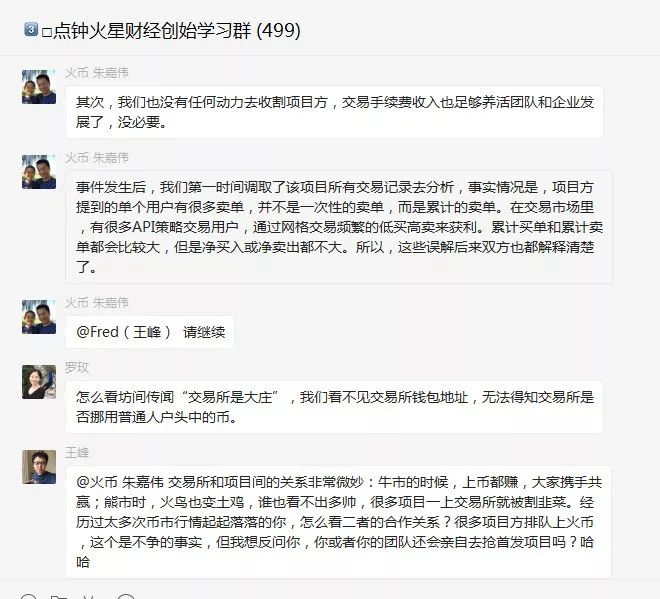
Fred Wang: The relationship betweenthe exchange and projects are delicate. During a bull market, all the listedcoins can make profit and everybody wins the game together. During a bearmarket, however, even the good coins hardly perform well, and many projectsfall the moment they get listed. As someone who has experienced the ups anddowns of the coin market, how do you feel about the relationship between thetwo parties? It is true that many projects are waiting in line to get listed onHuobi. But let me ask you, do you or does your team still compete for theinitial coin offering (ICO) of a project?
Jiawei Zhu: From the perspective of anexchange, a good project can boost its development, but a bad one may destroyit. Therefore, we still compete for good projects. From the perspective of aproject, a good exchange can support its performance but a bad one may ruineverything as well, so we try our bestto provide good services and assistance to the projects. Exchanges and projectsneed to support each other and win together. Our goal is to release the fulltoken value and liquidity for the projects.
Fred Wang: When interviewing ChangpengZhao from Binance, he said, “You will see in our listingapplication form, there is a blank for you to name your price. It can be zero.We will collect all information all at once and review them. If you trulybelieve in your project, feel free to write down zero.” That’s a shrewd answer, but it alsoindicates opportunities of free listing on Binance. Are there similaropportunities at Huobi?
Jiawei Zhu: Of course. HADAX started to support freetoken listing from the third phase. There were also cases of free listing inthe early phase of Huobi Pro. Apart from those, there are times when we onlyask projects to spend on things like operating or marketing activities.
Question 5: Why is Huobi Doing PublicChains?
Fred Wang: I have always wanted to askLin Li why he tries to do everything on his own. Let’s discuss your efforts todo public chain. On June 6 in Singapore, Huobi announced its decision to buildHuobi Chain. Huobi Token (HT) will be used as its primary tokens. Someone incharge of a public chain project told me that even Bitmain is not ready to do apublic chain. What’s the incentive of Huobi? Why don’t you make use of theexisting resources and technologies from the industry? When launching theBinance Chain, the purpose of Binance is to set up a new decentralizedexchange. Is that also the motivation of Huobi?

Jiawei Zhu: There are three motivations. The first isbelief. For us, the current trading platform is only the primary form offinancial asset exchange, and is likely to evolve into a distributed system. Asan important power in the blockchain industry, we have the belief and are readyto explore in this direction.
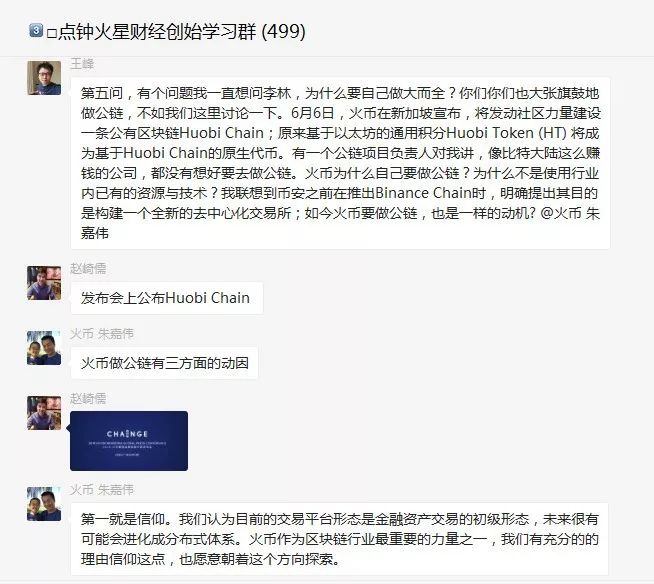
Secondly, Huobi has an ambitious planthat features “Platform-Ecosystem-Public Chain” in its 2.0 era. We made astatement some time ago, announcing that HT has been updated to a globaleco-pass. The Hadax eco-sector has also opened up. For eco-partners of Huobi,there is an opportunity for their tokens to become HT-based sub-eco-pass. Thebonus of Huobi’s development will be shared by all.
Things work better in our own ecosystem, andthat’s why we are doing this on our own. Huobi Chain will not become a decentralizedexchange. At least that’s not the whole purpose. Huobi Chain is a public chainfor self-financing.
Thirdly, we really want to produce apremium public chain, a next-generation public chain for self-finance thatrepresents the highest industry level. The generation, circulation,notarization and confirmation of all assets and warrants shall be conducted onthe public chain to guarantee the safety, performance, supervision andexpansion.
Fred Wang: According to Yuming Yuan,President of the Huobi Block Chain Research Institute, a good public chainrecognized by the industry is yet to be invented, and everything is possible. However,developing a public chain is far more difficult than we can imagine. There arechallenges regarding TPS, scalability and security. Is Huobi ready for these?It takes a long time from R&D to launch, and cannot be done without a coreleader. Of course you have the money, butut in case Huobi doesn’t win thecompetition as an exchange, will you continue to pursue Huobi Chain?
Jiawei Zhu: The exchange is a core competency of theecosystem. If it does not gain an upper hand in the competition, the influenceof the public chain will also be compromised. On the other hand, development ofthe public chain will also benefit the exchange by providing a premium asset. Therefore,we will push for the establishment of Huobi Chain while continuing to build thecompetitive advantages of the exchange.
Huobi is now initiating ecosystem-buildingin its 2.0 era. We are not working alone. Over a dozen departments of Huobi areworking together to push for the development of the ecosystem. We are alsotaking 3000 HT to attract outstanding public chain leaders and to gathertechnologies and talents from all over the world. Through exchanges andcommunications and with the support of the ecosystem and technologies, the bestleadership team will be built, and a premium block chain will be created. Afterall, a successful public chain requires both the technology and the ecosystem.Huobi Chain needs support from many different areas. We welcome the joining ofmore talents to become leaders of the team.
Question 6: “EOS is Highly Representative,and We Might be Venturing on the Same Path”
Fred Wang: Thecompetition for EOS is going vigorously with the participation of over 120project teams. Huobi Pool was only established in late March. In early May, itdecided to join the campaign to compete to be an EOS super node. Why is Huobi involvedin the campaign? Why are you competing with Huobi Pool instead of HuobiExchange? According to the latest ranking on July 5, Huobi Pool ranked 13thwith 54,019,935 votes. Is the performance good enough to you?
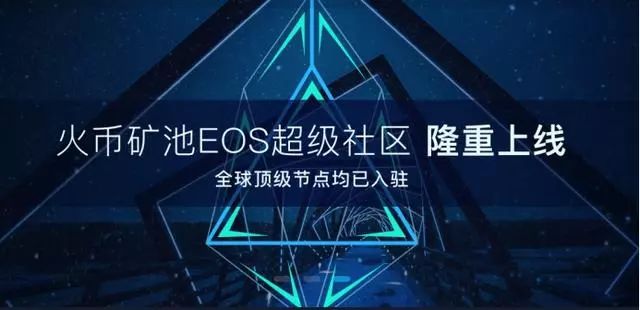
Jiawei Zhu: EOS super node is a great try on DPOS, ahistoric event in the development of cryptocurrency, an important event in theself-governance of communities, and the first global voting in human history.
Huobi is involved in the campaign for tworeasons. On the one hand, we hope to that through our effort, more people cancome together to promote the development of the EOS ecosystem, get deeplyinvolved in a certain blockchain community and make their contributions. On theother hand, we also hope to accumulate more experience for the establishmentand promotion of our own public chain. EOS is highly representative, and wemight be venturing on the same path.
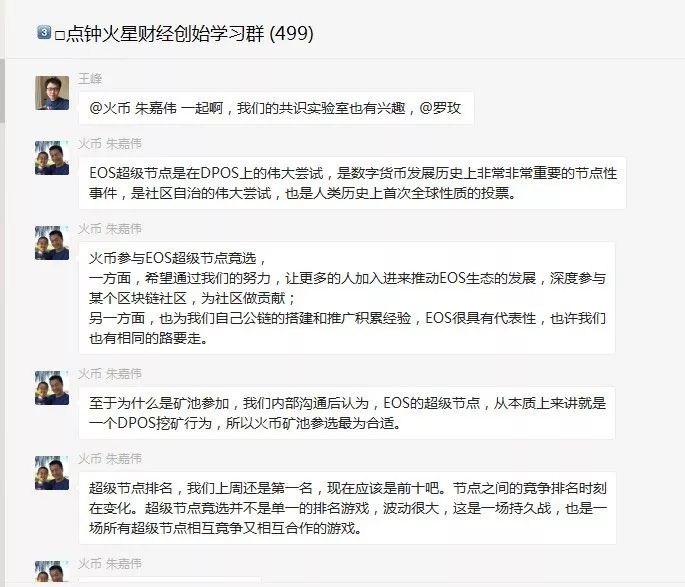
As for the reason to choose Huobi Pool,we’ve decided that EOS super node, in the essence, is DPOS mining. Therefore itis most appropriate to use Huobi Pool. We were on the top last week, and stillremain in top 10. The ranking is changing all the time and it’s a long-timebattle. This is a game of both competition and cooperation.
Fred Wang: On May 14at the Huobi EOS Global Super Node Show, the Huobi EOS Super Community wasofficially launched. The community attracted applications from numerous EOSnodes from all over the world including EOSAsia, EOSUnion, HelloEOS,EOSGravity, EOSCANADA and Eosio.SG etc. With the fierce competition going on,why is Huobi building the platform for other competitors?
Jiawei Zhu: Being voted super node is not our onlytarget. The purpose of joining the campaign is to be the first group of EOSsuper nodes and assist the development of EOS. We did three things, namely thesuper community, EOSDAPP fund and EOS transaction area. Different nodes of EOSare not only competing but also collaborating. The ultimate goal is to build ittogether, and the campaign should aim at finding the one that makes the biggestcontribution. In other words, the essence of the campaign is to reachcooperation. Therefore, we are building the EOS super community to gathercapabilities, facilitate the exchange of information and reach more efficientcooperation.
Question 7: The Reasoning Behind Spending100 million on a Building in Hainan…
Fred Wang: Accordingto media report, the People’s Bank of China, together with other departments,issued a series of policies to prevent possible financial and moral risks. Thespecific policies include blocking cryptocurrency trading platforms. As of May2018, 110 websites (including Huobi and Binance) have been blocked. Whatsignals do you think that represents? As a target of such policy, are youimpacted, and how bad is the impact?
Jiawei Zhu: We have not received any notice now.Huobi is aiming at global development and will abide by local laws. We keepclose contact with the supervising authorities and make adjustment accordingly.We hope to be a compliant blockchain service provider.
Fred Wang: On April30, Huobi decided to set up its China HQ in Hainan. After locating its China HQin Hainan, Huobi will also provide a 1 billion USD global blockchain industryfund, set up 10 global block chain+ labs, a block chain research institute andestablish a 40,000 m2 blockchain incubator. Someone on Weibomentioned that Huobi has spent 100 million RMB on a building in Hainan.Zhejiang, Chongqing, Hebei are all promoting the development of blockchain withrelevant policies to attract blockchain enterprises. Why did you choose Hainanas your China HQ? After all, compared with Hangzhou, the human resources inHainan is less ideal.
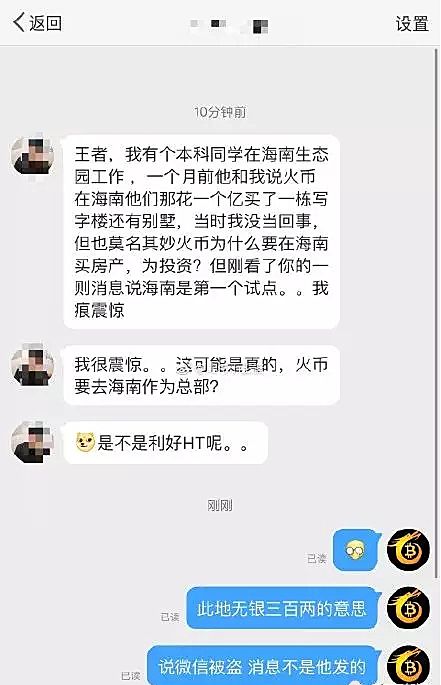
Jiawei Zhu: The supervising authority has laid out anew direction for the development of Hainan, and the development opportunitiesof the free trade island pose unlimited possibilities for the blockchainindustry. As a company that follows national regulations and laws, Huobi isalso answering the call of the central government and hopes to contribute tothe development of the Hainan free trade island. We do have a building inHainan, and will invite our partners and friends when it’s ready.
Fred Wang: Huobi movesto Hainan as the government issues Guidanceon Supporting the In-Depth Reform and Opening Up of Hainan Province topromote the reform and opening up of Hainan Province and set up the free tradeharbor. Some say that Hainan is ready for some big moves in blockchain andcryptocurrency. Manzi Xue also mentioned in a public form that “Hainan islikely to become a special economic zone for blockchain on the Chinese mainland”.However, we don’t see any tangible moves by far. Is that only speculation?
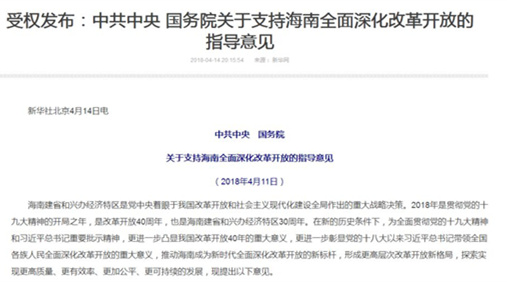
Jiawei Zhu: With the progress on infrastructures likethe public chain, the block chain technology will need a scenario to beimplemented. Huobi hopes to make its own contribution. Meanwhile, we also wishto learn, to gather experience and to distribute our ecosystem in the course ofdevelopment.
Question 8: “18 Business Divisions, 1,100People, Huobi is More Than an Exchange”
Fred Wang: Let’s talkabout people and management culture. You have the most to say about the corporateculture of Huobi. The corporate culture has a lot to do with its founder, andyou are probably the closest one to Lin Li, CEO of Huobi. You were colleaguesat Oracle, and have been working at Huobi together for over 4 years. That’s avery long time in the blockchain world. What do you think is the biggestcultural difference between the current company and your previous employer?
Jiawei Zhu: Haha that’s true. People say that one dayin the blockchain community is like a year in the world. That’s how fasteverything is going. As someone in the industry, you see the changes andprogress every second of every day. It seems that blockchain and WeMedia ispushing everything faster. After joint the industry, we are receivinginformation from all over the world all the time and have to respond to themimmediately. As I often said to my colleagues, working in the industry for ayear gives you several years of experience. That’s a good deal.
Fred Wang: Many saythat Lin Li is a good friend. He spoke for Jun Du when he was in trouble, anddidn’t say anything when Du left Hadax after saying some quite strong words. Ialso heard that he always tries to protect those who left Huobi and is willingto be their angel investor. How do you two get along? What is he like in youreyes?
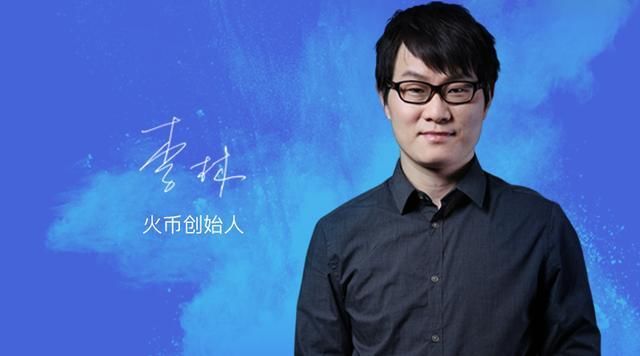
Jiawei Zhu: He is a good friend and a good boss. Interestingly,Li and I built our friendship over table tennis at Oracle. I was alwaysinterested in his project, which led me to join Huobi.
Because of the trust between us, I amalways direct and blunt with him. To me, trust is not about believing he can dothings right, but about telling him the real thoughts in your mind without anyworries. Such trust leads to a culture of highly efficient communication and weare trying to build that culture throughout the company.
Li strikes many as a person withintegrity, ambition and responsibility. Such qualities are important in thisindustry. You have to stick to your mission and communicate that to your teamto change the world together. When you do something wrong, you have to takeresponsibility and carry on. Li also makes fun of himself as an expert offorcing others to exploit their potentials. He has a unique eye for teambuilding and is willing to trust others and provide opportunities to others.
Fred Wang: When Hadax wasmodifying the rules for super nodes, some departments in Huobi were accused of “bureaucracy”due to the lack of communication. Li answered that unsupervised power leads tobureaucracy, which is just human nature. Is there a vacuum in the managementregulations and procedures that leads to the lack of supervision? Li said thatwhen he rested for a while because of health conditions, the company actuallydid better. Do you think he has the problem of giving too much power away?
Jiawei Zhu: Haha interesting. Huobi expanded from 200people from last November to 1100 members now. Such rapid development has ledto great pressure and burden to the senior and lower management team. With 18business divisions, Huobi is more than an exchange. Many business divisions arenew with new people and new business. Therefore, the management regulations andprocedures are still being set up.
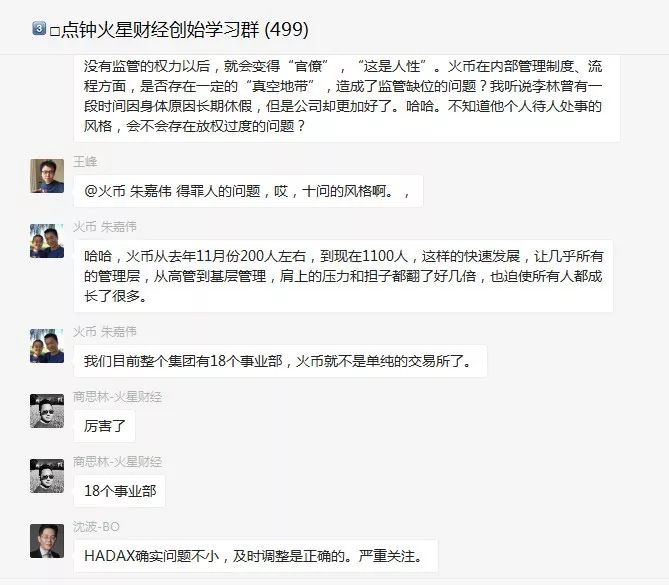
When going through explosive expansion,many start-ups are faced with different kinds of problems. Our management teamexists to address these problems. Be it bureaucracy or human nature, that’s notsomething we want so see. We are determined to solve them and will try our bestto keep only the right members on the team, optimize the inappropriateprocedures, nurture a premium team and provide better service.
Li has to have some days off because ofpersonal reasons, but the development of Huobi is never compromised. Theexpansion of the team also means each of us is given a clearer responsibility. Also,the company has a well-defined access system, and punishment will be imposedwhen there are accidents or mistakes.
Fred Wang: Of theseveral exchanges in the top tier, Huobi has the biggest number of employees. Throughour dialogue, I’m aware that Huobi now boasts over 1000 employees and 18business divisions. Do you want market share or a big size? The explosive developmentof blockchain only started last year, but Huobi has already deployed businessesin mining pool, exchange, information and public chain. All businesses areprofessional and independent. Do you think it hurts the company’s competency toget involved in so many sectors in such an early phase?
Jiawei Zhu: In as earlyas 2014 and with only over 100 staff members, Huobi drafted its whole-industrystrategy. That one didn’t work out. This round of ecosystem deployment is actuallydriven by our people. Compared with 2014, questions about the industry havedied down and more and more outstanding talents are involved in the area. Weneed great talents to do great things.
From the business perspective, theexchange business can only meet some demands of the users like buying andselling. Meanwhile, users have the need for information, exchange ideas in thecommunities, take part in offline gatherings, deposit and consult investmentexperts, all of which require different business units and products. Seizingthese opportunities will also contribute to the development of the exchange asmany people are exposed to this area in places other than the exchange. That’salso why we are deploying our strategy now.
Most of the businesses we get involved inare related to exchange and blockchain and are never beyond the industry. Suchbusinesses will probably be integrated to a certain extend in the future. Asthey complement and support each other, we see the power of the system. Ofcourse, a growing team leads to management problems, but these are common forstart-ups on the road of development.
Question 9: How do you view the recordingof Xiaolai Li?
Fred Wang: A couple ofdays ago, a voice recording of Xiaolai Li in a private conversation wasexposed. The recording contains a great deal of information including manyblockchain projects and names. It also involves his attitudes towards Ethereum,Ripple, Qtum, and TRON as well as public chain investment. Hongfei Da, ChuShuai, Lihua Yi and Changpeng Zhao were all mentioned in the conversation. Therecording created quite a stir among the people and in the industry. How do youlook at the incident of a public blockchain figure causing such a public sensationwith his words?

Jiawei Zhu: Haha, to behonest, other than some key points summarized by others, I didn’t listen to therecording or read the transcript closely. There are objective facts andsubjective ideas in the recording. Commenting on other people or the industryin general usually creates heated discussion. WeMedia gives people the abilityto publish and spread information. That’s just the time we are living in.
Fred Wang: In therecording, Xiaolai Li mentioned,“Opening a 2B exchange is like opening a blog.You give it a name, find a domain, click your mouse, and there it is. Everyonewanteds to set up their own exchange in 2013, and that was the future.” Whiletalking with others, we also believe that the current exchanges may disappearin the future, as every project owner is capable of opening their owntransaction scenarios. If an exchange platform can open up its trading systemto all blockchain projects for free, will that cause great impact to thecurrent exchange models? Will exchanges still exist in 3-5 years of time? I’dlike to hear your reply.
Jiawei Zhu: Right, somecompanies are selling their trading systems. The trading system for blockchainassets is different from an ordinary trading system. When the scale reaches acertain level, you’ll have to think about security, risk management, concurrentlisting, and performance. It’s completely different from the start. Our move ofdoing global deployment and seeking for global partners is also an export ofthe exchange system. We are now in South Korea, Australia and the US, and willventure on to Canada, Brazil and other countries.
If we look at the development, the generaltrend is to make things more and more convenient for the users. Exchanges thesedays are not convenient enough, but they will continue to exist as the corelink for pricing and converting. They will probably take a different form wherethe demand of selling and buying the coins and that for transaction are separated.Many people acquire their blockchain assets through the exchanges, but willprobably go for direct conversions with individuals going forward. Therefore,centralized exchanges for top projects and decentralized exchanges forlong-tail projects might exist at the same time in the future.
Question 10: The Shortest Question
Fred Wang: Lastquestion. What are the concerns of Huobi? Will it continue to be popular?
Jiawei Zhu: When we arehaving morning meetings or weekly meetings, I often tell my team that we arejust 24 hours from closing down. We always keep a close eye on security andrisk management. In our industry, security incidents are not unusual. Therefore,we have made a great deal of investment in security and have set up athird-party security alliance to address and guarantee security issues in theindustry. I believe that will be our core competency in the future.
I am also concerned whether our team cancatch up with the speed of the industry. Different from other industries, oursis filled with new knowledge and innovation every day. You are not only leftbehind when you don’t make progress, but will be defeated by others.
I worry every day that my team might betoo anxious and impatient to actually make a contribution to the industry. Youhave to stay composed in both times of success and failure, and hold on to youroriginal mind to follow the progress of the industry. As I often say in ourmeetings, you are on a downhill path when others come to you for advice, andonly on an uphill path when you go to others for advice.
I have many concerns, but I also believe in the future ofHuobi. Being popular is not our goal. We aim to attract more people into theindustry to enjoy the benefits of the industry’s development, change the mindof a generation of people and change the way the world runs together withHuobi.
Fred Wang: In thecryptocurrency market, competition between exchanges never cease. There arealways new challenges, new product designs and new business reforms. Huobi hasdone a great job coming so far. Every exchange is witnessing, participating,writing and creating the new era.
It occurs to me thatwe both have programs on Ximalaya FM, and I followed your program Learning about Block Chain from 0 to 1. Butmy program is for free, yours is not. I’ve been thinking that there should be adebate version for “10 Q with Fred Wang”. I can be the host while two of ourguests exchange ideas on the program. Let’s talk again by then. Thank you againJiawei for coming to “10 Q with Fred Wang”. I wish Huobi a great future andlook forward to seeing how we can change the world together. Thank youeveryone.
Click here to see past history.
本文为MarsBit原创稿件,版权归专栏作者所有,未经授权不得转载,转载须在文章标题后注明“文章来源:MarsBit(微信:hxcj24h)”,若违规转载,MarsBit有权追究法律责任。




